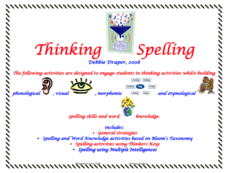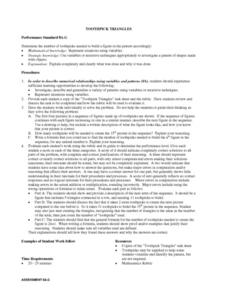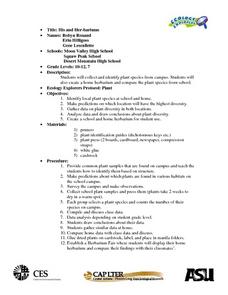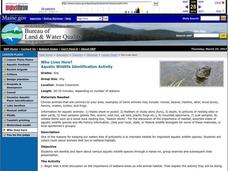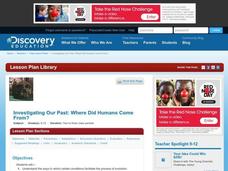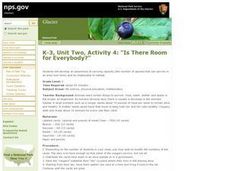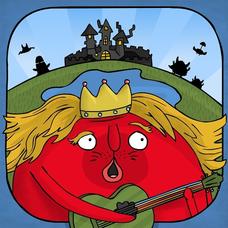Curated OER
Thinking Spelling
An etymology resource is packed with suggestions for activities designed to build phonological, visual, morphemic, and etymological spelling skills.
Curated OER
Arizona Plant Booklet: An Introduction to Arizona Plants & Cacti
Young scholars explore variety of plants & cacti in their Arizona community by collecting samples and taking photographs. Can be adapted to other areas.
Curated OER
Toothpick Triangles
Students draw a chart (included in the lesson) to use with their investigation. They review terminology of triangles and receive toothpicks to use in the lesson. Beginning with three toothpicks, students form a triangle. They complete...
Curated OER
Science: Her-bariums Galore!
Students collect and identify plant species and construct herbariums both at school and at home. By gathering data from both locales, they draw conclusions and make predictions about plant diversity. Upon completion of the exercises,...
Curated OER
Art: Coral Reef Ala Oil
Students investigate Australia's Great Barrier Reef and create oil paintings of it. After their research, they apply various painting techniques to depict air bubbles, sun's radiation, and color blending. For older students, the...
Curated OER
Paper Pets
In this paper pets genetics worksheet, students are given 4 genetic traits found in a particular species (paper pet). Students are given the genotypes of the parents of the paper pets and they perform genetic crosses using punnet squares...
Curated OER
Who Lives Here?
Students identify various aquatic wildlife species. In this biology lesson students collect clues about animals that live in wetland habitats. Students rotate through several stations displaying particular animal species to collect their...
Curated OER
Investigating Our Past: Where Did Humans Come From?
Investigate the theories of human evolution. In this research based lesson plan, learners research and discuss how geographic isolation, interbreeding, generalization, and specialization are factors in the history of humans. Groups work...
Curated OER
Chapter 23 Guided Notes: The Origin of Species
This doesn't have to be used as a guided notes worksheet because the questions are thought-provoking and applicable to any biology class that is learning about the origin of species. Pupils write out answers to questions about...
Curated OER
Is There Room for Everybody?
Third graders examine the capacity of animals able to live in one habitat. For this habitat lesson, 3rd graders play a game that shows the food chain and the interactions between animals in an area. Students discover that food is a major...
Curated OER
Science Jeopardy
Wow! Review an entire semester of biology curriculum playing this Science Jeopardy game! The variety of topics is extremely broad, so you will need to review each question to find if they all apply to your course. As you find material...
National Wildlife Federation
Box Turtle Interview
Imagine life as a box turtle. Learners study the characteristics of box turtles and then assume the role in an interview. They show their understanding of how a box turtle lives by responding to a series of questions.
Illustrative Mathematics
Are These Right?
Is that a right triangle or a wrong triangle? Young mathematicians look at eleven different shapes and use a measuring tool of their choice to determine which triangles have right angles. Consider cutting out sets of the shapes to...
Virginia Department of Education
Classifying Angles
Don't be obtuse, this geometry unit is the just the right resource for educating the acute young minds in your class. From classifying and measuring angles, to determining the congruence of shapes, this resource covers a wide range of...
EEWeb
Geometry: Shapes and Solids
An excellent resource for a geometry class, as well as for an electrical engineering course. A thorough reference sheet covers geometric shapes such as triangles, parallelograms, and circles, as well as 3-D shapes and the Pythagorean...
Lerner Publishing
Meet the Dinosaurs
Take your class of youngsters on a prehistoric adventure with this four-lesson series on dinosaurs. Accompanying the Meet the Dinosaurs books by Don Lessem, these lessons engage children in writing their own dinosaur books, making...
Geometry Accelerated
Accelerated Geometry Review Sheet
Your geometry learners use their knowledge of various geometric concepts to write proofs. Starting with givens containing parallel line segments with transversals and triangles and quadrilaterals, and the mid-point and distance formulas;...
iMagine Machine
The Land of Venn - Geometric Defense
Young mathematicians use their geometry skills to save the Land of Venn in an engaging math game. A fun way to reinforce children's understanding of basic geometric figures and shapes.
Scholastic
Minibeasts
Lead young scientists to discover insects outdoors. After investigating, students will record observations, learn about these fascinating creatures, craft, and role play.
Prezi
The Six Kingdoms
Why can't dinosaurs clap their hands? Because they no longer exist. The six kingdoms do exist, and through the presentation individuals discover kingdom names, their description, and view photographs of a few samples.
National Park Service
Civil War to Civil Rights: From Pea Ridge to Central High
Explore how the Civil War impacted the Civil Rights Movement. Class members complete a series of projects for a unit that uses a layered curriculum approach to learning.
New South Wales Department of Education
Plant Features
Pine needles are actually modified leaves. In the 16th installment of 20, young scientists explore plants. Through an analysis of leaves — shape, veins, and edges — pupils see how to classify plants based on structural features.
Allegany-Limestone Central School
Plantae WebQuest
Send your young life scientists on a plant webquest that has them reading case studies to decide if seeds are seeds and plants are plants.
Biology Junction
Nonvascular and Simple Vascular Plants: Mosses to Ferns
Sometimes conservationists use specific plants to prevent erosion or fight invasive species. A 50-slide presentation covers both nonvascular and vascular plants. It discusses the plants, their stages and life cycles, reproduction, uses,...
Other popular searches
- Taxonomy
- Bloom's Taxonomy
- Using Taxonomy
- Blooms Taxonomy
- Math Classification
- Animal Classifications
- Plant Classification
- Classifying Animals
- Classification of Animals
- Animal Kingdom
- Soil Classification
- Classification Keys


